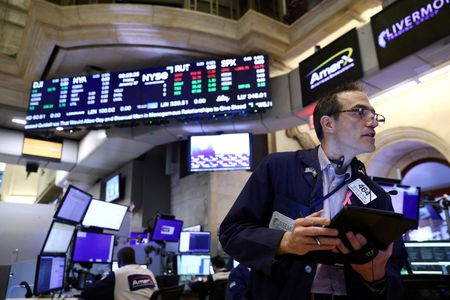By Saqib Iqbal Ahmed
NEW YORK (Reuters) – Some of Wall Street’s most speculative names, including meme stocks and shares of artificial intelligence companies, are leading the equity market rally this year, helped by renewed interest from retail investors.
Retail investors had a poor year in 2022, with the average portfolio ending the year down around 35% from all-time highs, Vanda Research previously estimated.
However, retail investors have shown renewed interest in the early part of 2023. Aggregate inflows into the U.S. stock market, though concentrated in a few names, has reached levels last seen in 2020-21, according to Vanda Research.
Shares of companies linked to artificial intelligence have soared after U.S. firm OpenAI, the owner of ChatGPT, a chatbot that gives strikingly human-like responses to user queries, snagged a multi-billion dollar investment from Microsoft Corp.
Meme stocks have clawed back some of last year’s losses, while shares of larger, tech-focused companies such as Nvidia and Tesla have also joined in the fray.
The Nasdaq Composite Index, home of many smaller, more speculative companies as well as the megacaps, is up 13% this year, after a 33% loss in 2022. The S&P 500 index is up about 7%.
“We’ve definitely seen risk appetites return to equity markets this year,” said Steve Sosnick, chief strategist at Interactive Brokers.
GRAPHIC: Artificial Intelligence & meme stocks (https://fingfx.thomsonreuters.com/gfx/mkt/lbpggbdrbpq/Pasted%20image%201676053309646.png)
AI BOOM
Companies building artificial intelligence tools have been among the rally’s biggest winners, a move market observers say has been driven in part by retail investors.
Big gainers include shares in analytics firm BigBear.ai, which are up 500% this year, and chipmaker Nvidia, up 50%. Meanwhile, Google-parent Alphabet and Microsoft jostle to pull ahead in the race for the next big growth driver.
Five of the largest Artificial Intelligence ETFs, which offer exposure to firms involved in the development and production of robots or artificial intelligence, have grown assets to $4.27 billion, up 18% this year, compared with a 10% rise in assets for the Nasdaq 100-tracking Invesco QQQ ETF.
Meanwhile, shares of early meme stocks GameStop and AMC Entertainment have pared some losses after last year’s tumble.
Not all meme stocks are thriving, however: shares of Bed Bath & Beyond, which soared as much as 180% in early February, have retreated to trade down 19% for the year as investors await details on whether the struggling retailer can avoid bankruptcy.
GRAPHIC: A different time (https://fingfx.thomsonreuters.com/gfx/mkt/klvygdoemvg/Pasted%20image%201676054718638.png0
CONDITIONS TIGHT
Many market participants are quick to draw contrasts between the current rally in speculative names and meme stocks’ initial surge in 2021.
One key comparison is bond yields, which now offer increased competition to stocks after hitting multi-year highs in 2022 as the Fed tightened monetary policy. Investors have recently recalibrated how high the Fed might raise rates this year amid signs of a stronger-than-expected job market.
“The current state of play is undoubtedly more challenging,” analysts at Vanda Research said in a note on Thursday.
The Fed’s rate-hiking campaign has tightened financial conditions relative to two years ago, with the Chicago Fed’s U.S. National Financial Conditions Index (NFCI) at -0.36, compared to -0.62 in 2021, signaling tighter financial conditions.
GRAPHIC: Options action (https://www.reuters.com/graphics/USA-STOCKS/jnvwyxzegvw/chart.png)
OPTIONS ACTION
The return to risk-taking is showing up in record trading volumes in the U.S. options market.
Demand for calls, which convey the right to buy stock at a fixed price in the future, has outstripped puts, typically used for bearish wagers, with 1.15 calls traded for every put over the last month, per Trade Alert data.
Still, that measure is not as euphoric as in 2021, when it reached a high of two calls traded for every put.
SHORTS TAKE AIM While retail traders may be rushing in, short sellers – who aim to profit by selling borrowed shares and hoping to buy them back later at a lower price – have been adding to their bets, particularly in the AI space. “Investor enthusiasm is also attracting short-sellers that are skeptical about some of the resulting valuations,” said Evan Niu, an analyst at Ortex, which tracks real-time short interest data. Short interest for C3.ai stands near an 8-month high of 19%. AI software firm Veritone, SoundHound and BigBear.ai also show a pick up in short interest, Ortex data showed.
At the same time, short sellers are digging in their heels on their bets against Bed Bath & Beyond, with short interest at a near 6-month high of 48.6%, per Ortex data.
GRAPHIC: Short sellers smell blood (https://www.reuters.com/graphics/USA-STOCKS/egpbyawkjvq/chart.png)
(Reporting by Saqib Iqbal Ahmed; Editing by Ira Iosebashvili and Nick Zieminski)


